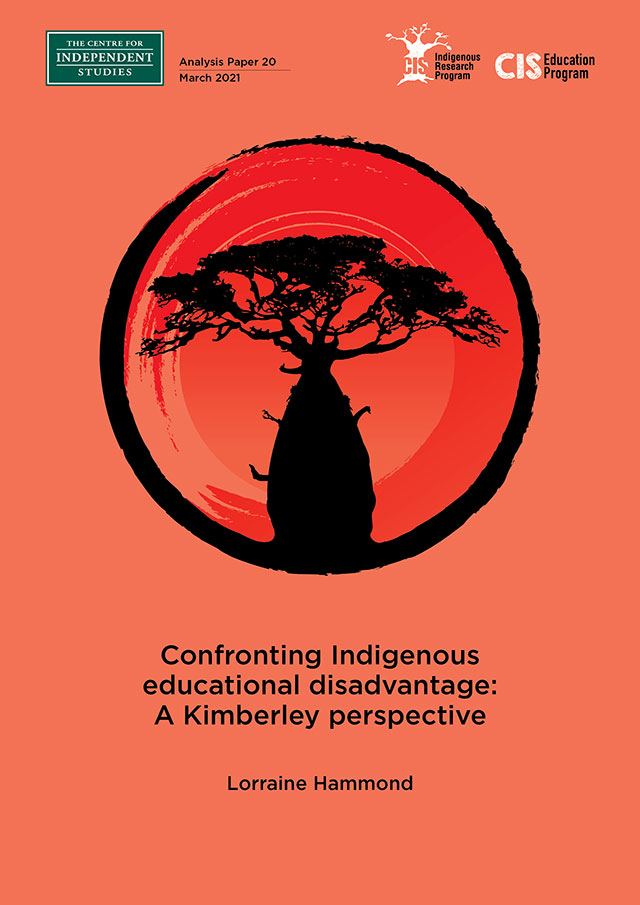
Overcoming Indigenous education disadvantage is possible with the right teaching approaches and school policies. It demands abandoning flawed and antiquated teaching approaches that have become popular in Indigenous education, as well as commitment to high expectations, and better preparation and development of teachers and school leaders.
Overcoming Indigenous education disadvantage: introduction
The challenges of education in Australia’s remote majority Indigenous communities are complex and persistent. The best intentions and considerable resourcing over decades haven’t translated into consistently higher quality instruction and unfortunately, not a significant improvement in broader Indigenous education disadvantage.
This paper documents the challenges faced on the ground by educators in Western Australia’s Kimberley Region, as well as the lessons being learned by a current initiative providing intensive training and professional development across 24 schools. The Kimberley Schools Project is evidence of a scalable model that privileges high impact instruction alongside attention to attendance, pre-school programs, and community engagement.
Removing Indigenous education disadvantage is a key national priority and much can be learned from the successes being delivered in participating Kimberley schools.
High quality education opens doors for Australian children — yet, this promise seems out of reach for many in majority-Indigenous remote communities. To a casual observer, the path to school may be a short walk, but the metaphorical distance these children need to traverse to the classroom is immense, littered with potholes, and often misunderstood by outsiders. And when children in remote communities do reach the classroom, the staff who greet them must be nothing short of exemplary teachers and administrators.
The best intentions and resourcing for decades haven’t always translated into higher quality instruction or significant improvement in broader education outcomes. But results are being achieved with a program that prioritises:
- high impact instruction;
- a focus on attendance;
- pre-school programs for zero to three year olds; and
- community engagement.
This scalable model includes professional learning and instructional coaching for 24 schools in the Kimberley Region of Western Australia and is the basis of my experience working in mostly-Indigenous remote communities. This paper discusses observations during school visits and professional learning, interactions with educators and community, and explores what is — and isn’t — working.
SELECTED REFERENCES
Dixon, R., Engelmann, S., Bauer, M. M., Steely, D., & Wells, T. (2007). Spelling Mastery [Curriculum program]. Science Research Associates.
Hattie, J. (2012). Visible learning for teachers: Maximizing impact on learning. Routledge.
Joseph, B. (2019). Overcoming the Odds: A Study of Australia’s Top-performing Disadvantaged Schools. Centre for Independent Studies. https://www.cis.org.au/publications/research-reports/overcoming-the-odds-a-study-of-australias-top-performing-disadvantaged-schools/
Kimberley Development Commission (2021). Demographics. https://kdc.wa.gov.au/economic-profile/demographics/
Liem, G. A. D., & Martin, A. J. (2013). Direct instruction. In J. Hattie, & E. M. Anderman (Eds.), International Guide to Student Achievement (pp. 367-368). Routledge.
Rosenshine, B. (2012). Helping students from low-income homes read at grade level. Journal of Education for Students Placed at Risk, 7(2), 273-283. https://doi-org.ezproxy.ecu.edu.au/10.1207/S15327671ESPR0702_9
Rosenshine, B., & Stevens, R. (1986). Classroom instruction in reading. Handbook of reading research, 1, 745-798.
Stockard, J., Wood, T. W., Coughlin, C., & Rasplica Khoury, C. (2018). The effectiveness of direct instruction curricula: A meta-analysis of a half century of research. Review of Educational Research. https://doi.org/10.3102/0034654317751919
Su, J. Y., Guthridge, S., He, V. Y., Howard, D., & Leach, A. J. (2020). The impact of hearing impairment on early academic achievement in Aboriginal children living in remote Australia: a data linkage study. BMC public health, 20(1), 1-13. https://doi.org/10.1186/s12889-020-09620-6
